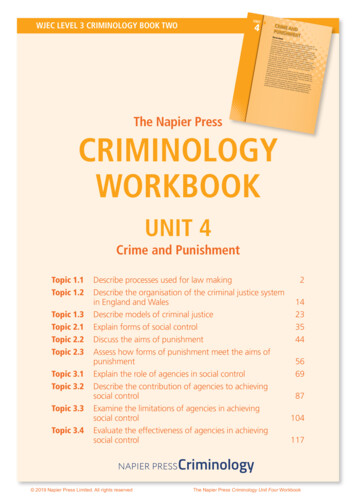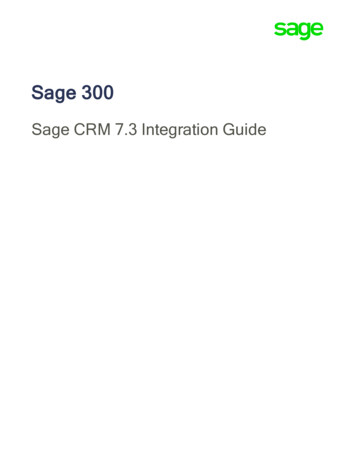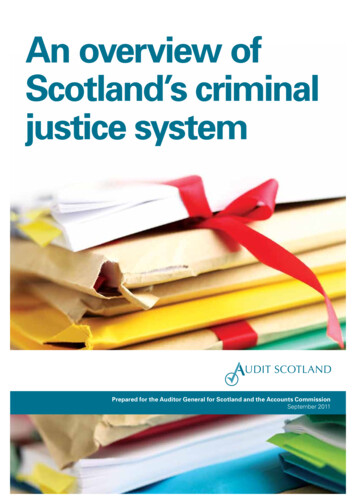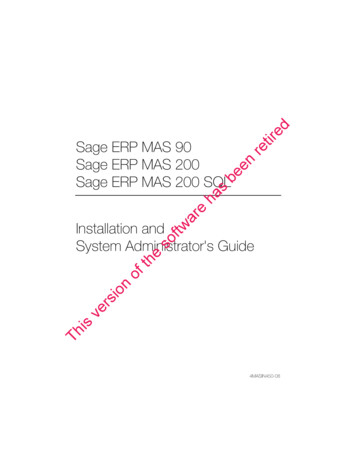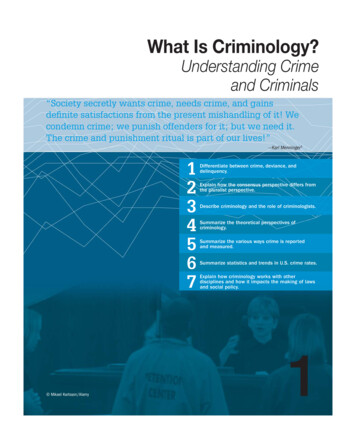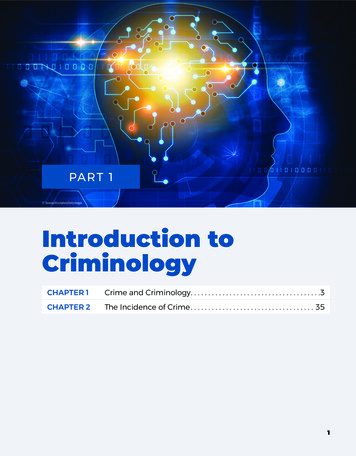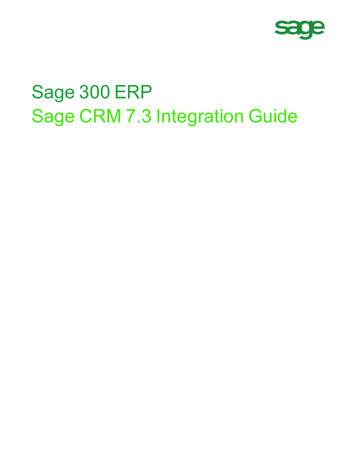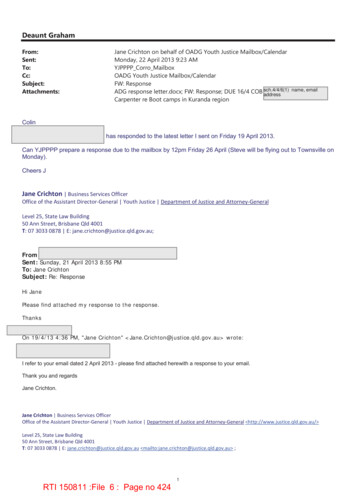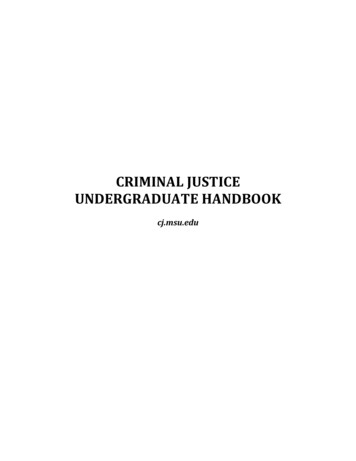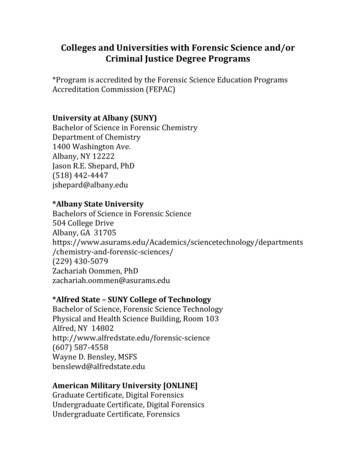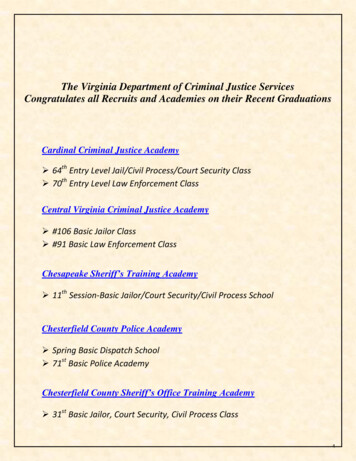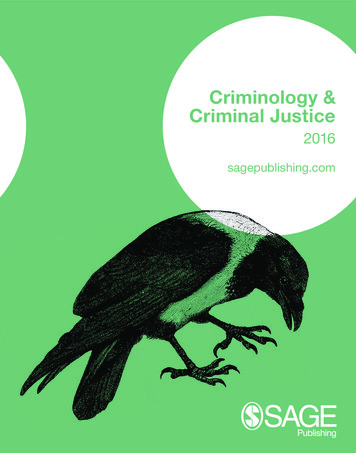
Transcription
Criminology &Criminal Justice2016sagepublishing.com
Criminology & Criminal Justice 2016Welcome.We’re really pleased to welcome you to our 2016 Criminology and Criminal Justice catalogue, in which we’re highlighting our new and recentbestselling titles.With coverage spanning victimology, green criminology, global policing, life-course criminology, and transnational crime, the books we’republishing in 2016 are exciting additions to our Criminology list, the breadth and depth of which we really pride ourselves on. It’s a list that cansupport students, lecturers and researchers at every stage of their academic career.With that in mind, we do of course have a huge range of titles not included in this catalogue and so make sure you have a look roundour website - why not start at our new dedicated Criminology and Criminal Justice page. You can also connect with us on Twitter at@SAGEcriminologyWe’re very excited to announce that the SAGE Criminology and Criminal Justice Video Collection will be launching in early 2017. The collection– featuring over 120 hours of video including In Practice videos, tutorial videos and case study videos, and with footage including policeusing technology on the beat, forensic scientists analysing evidence, and defence lawyers working with clients – will really help students tounderstand the application of the theories, concepts and practices they are learning about. Keep an eye out for more information soon!The SAGE Criminology and Criminal Justice team@SAGEcriminologyKey new titlesP3P4P7P11P8P8P2P20P18P2
Criminology & Criminal Justice 2016Contact usContents1 Oliver’s Yard, 55 City Road, London, EC1Y 1SPCriminology and Criminal Justice 2016.2-21 44 (0)20 7324 8500 44 (0)20 7324 8600sagepublishing.comKey ContactsNatalie Aguilera – Publishernatalie.aguilera@sagepub.co.ukSally Ransom – Books Marketing Managersally.ransom@sagepub.co.ukLauren Ashby - Journals Publishing Editorlauren.ashby@sagepub.comKeep up-to-dateTell us which subject areas you are interestedin hearing about and we’ll keep you up-to-datewith relevant products and special offers.Prefer to go paperless? You can switch offprint communications by updating yoursettings at:sagepub.co.uk/loginBestsellers in Criminology . 12-13Sales Information .22Index.23-24SAGE eBooksAll of our books are now available as eBooks in awide variety of formats. For full details visit:sagepub.co.uk/ebooksSAGE publishes. more than 35 journals in Criminology & CriminalJustice. For more information and pricing een SAGEWe recognise that our business operations have animpact on the environment and are committed tominimising them. Find out more:sagepub.co.uk/aboutCommunity.navInspection CopiesRequest and manage your inspection copiesquickly and easily atwww.sagepub.co.uk/inspectioncopyFree digital inspection copies are also available forlecturers - for details contact your local salesrepresentative at sagepub.co.uk/findmyrep
Criminology & Criminal Justice 2016INTRODUCTION TO CRIMINOLOGYAN INTRODUCTIONTO CRIMINAL JUSTICETheories, Methods, and Criminal BehaviorEdited by Jamie Harding, Pamela Davies both at NorthumbriaUniversity and George Mair Liverpool Hope UniversityA contemporary guide to the agencies, theories, concepts, policies,processes, practices and research that comprise criminal justice, thisexciting new introduction: places the work of the agencies of the criminal justice processin context by explaining their purpose and historical origins, thecritical policy issues they face, the type and extent of crime they dealwith, the explanations that are offered for crime occurring, and thecharacteristics of offenders, victims and witnesses examines evidence about the effectiveness of the criminal justiceprocess, in the context of debates about its purpose, enablingstudents to evaluate individual agencies and the process as a whole explores inequalities and injustices within the criminal justice process uses engaging learning features including extensive case studies,further reading, discussion questions and a glossary of terms is accompanied by a website featuring resources including multiplechoice questions, downloadable journal articles, podcasts and linksto relevant videosPacked full of insights from real-world practitioners, this is an inspiringand challenging read that will prove an invaluable resource throughouta student's Criminology degree.December 2016 576 pagesCloth (9781412962117) 85.00Paper (9781412962124) 29.992ORDER TODAYNinth EditionFrank E Hagan Mercyhurst CollegeFocusing on the vital core of criminological theory - theory, methodand criminal behaviour - with more attention to crime typologies thanmost introductory texts, this book investigates all forms of criminalactivity, such as organized crime, white collar crime, political crime andenvironmental crime. The methods of operation, the effects on societyand policy decisions, and the connection between theory and criminalbehaviour are all explained in a clear, accessible manner.This Ninth Edition has updated coverage of terrorism and counterterrorism efforts, as well as new coverage of emerging criminologicalmethods, such as ethnographies. All statistics, tables and figures havebeen updated, as have the photographs, supplements, and audio andvideo packages in the new edition to make the material most relevantfor courses.CONTENTSPart I: The Foundations of Criminology / Introduction / Research Methods in Criminology/ General Characteristics of Crime and Criminals / What Is Victimology? / Part II: Theoriesof Criminology / Early and Classical Criminological Theories / Biological and PsychologicalTheories / Sociological Mainstream Theories / Sociological Critical Theories and IntegratedTheories / Part III: Crime Typologies / Violent Crime / Property Crime: Occasional,Conventional, and Professional / White-Collar Crime: Occupational and Corporate /Political Crime and Terrorism / Organized Crime / Public Order Crime / Cybercrime andthe Future of CrimeMarch 2016 488 pagesPaper & Interactive eBook (9781506353616) 78.00 44 (0)20 7324 8703 44 (0)20 7324 8700sagepublishing.com
Criminology & Criminal Justice 2016CRIMINOLOGICALTHEORY IN CONTEXTAn IntroductionJohn Martyn ChamberlainLoughborough UniversityA clear and thought-provoking read. Theauthor has summarised detailed historicaland burgeoning literature into a book thatis well structured and written, allowingcriminology students to become excitedover theory and to question taken-for-granted assumptionsin the field- Dr Ruth McAlister, Lecturer in Criminology,University of UlsterProviding a lively, concise and definitive account of criminological theory,this book offers a guide to the historical development of criminology asan academic discipline. It:VICTIMS, CRIME AND SOCIETY presents an overview of criminological theory, including classical,biological, psychological and sociological approaches analyzes the strengths and weaknesses of each theory discussed makes the theory as clear as possible, with chapter overview boxesand key summary points helps students take their studies further with suggestions for furtherreading and self-study tasks.CONTENTSAn IntroductionSecond EditionEdited by Pamela Davies, Peter Francis both at NorthumbriaUniversity and Chris Greer City University LondonPraise for the previous edition:This book achieves the rare feat of helping its readers withoutpatronising them. The aids to the reader - tables, boxes,glossaries, questions and suggestions for further reading - willprove genuinely helpful to students and their teachers, but theyappear within a text that is theoretically informed as well ascomprehensive and up-to-date in its coverage- Professor David Smith, University of LancasterStudying Criminal Life / Classical Criminology and Contemporary Rational ChoiceTheory / Biological Criminology / Psychological Criminology / Strain Theory, SocialDisorganisation Theory and Labelling Theory / Critical Criminology, Part 1: Marxist,Peacemaking and Realist Theories of Crime / Critical Criminology, Part 2: Feminist andCultural Criminology / Postmodern Critical Standpoints and the Criminal Life Course/ Reflecting on Theories of Crime, Theories of Human Nature: Crime in the Age of theEnterprising Risky Citizen-subjectJanuary 2015 232 pagesCloth (9781446269862) 75.00Paper (9781446269879) 24.99CRIMINAL PSYCHOLOGYProviding a thorough account of victimization across the social spectrumof class, race, age and gender, this Second Edition has been fullyrevised and expanded, with two parts now spanning the key perspectivesand issues in victimology.Four-Volume SetCovering theoretical, social and political contexts, the book: includes new chapters on defining and constructing victims, fear andvulnerability, sexuality, white-collar crime, and the implications ofcrime policy on victims examines a global range of historical and theoretical perspectives invictimology and features a new chapter on researching victims of crime reinforces learning through critical thinking sections, future researchsuggestions, chapter summaries and a glossary of key terms now includes a companion website, complete with links to relevantjournal articles in victimology.This four-volume set of definitive publicationsin the area of criminal psychology providesa gateway to theory, research and practice,and is designed to be a vital research toolfor students, researchers and practitionersworldwide. T he volume s pre sent aselection of important publications with anemphasis on seminal works from many different countries, reflectingthe increasingly global reach of the topic. Each volume includes anintroduction by the editor, to contextualize the historical, theoretical andempirical significance of the articles contained therein.CONTENTSCONTENTSPart I: Key Perspectives In Victimology / Defining Victims and Victimisation / ConstructingVictims and Victimisation / Fear, Vulnerability and Victimisation / Historical Perspectivesin Victimology / Theoretical Perspectives in Victimology / Research Perspectives inVictimology / Global Perspectives in Victimology / Part II: Key Issues In Victimology /Gender, Victims and Crime / Young People, Victims and Crime / Older People, Victimsand Crime / Social Exclusion, Victims and Crime / Victims of White-Collar Crime / Race,Religion, Victims and Crime / Sexuality, Victims and Crime / Victims of the Powerful /Victims and Crime Policy / ConclusionNovember 2016 400 pagesCloth (9781446255902) 90.00Paper (9781446255919) 29.99Available as inspection copy for lecturersEdited by David CanterUniversity of HuddersfieldVOLUME ONE: PSYCHOLOGICAL CAUSES OF CRIME / Part I: Pathways to Criminality /Part II: Personality and Crime / VOLUME TWO: CRIMINALS' CHARACTERISTICS / PartI: Criminal Lives / VOLUME THREE: VIOLENT CRIMES / Part I: Crimes in the Family / PartII: Crimes Against Strangers / VOLUME FOUR: PSYCHOLOGY AND INVESTIGATIONS /Part I: Detecting Offenders / Part II: Investigative InformationSAGE BENCHMARKS IN PSYCHOLOGY2014 1584 pagesCloth (9781446286067) 745.003
Criminology & Criminal Justice 2016AN INTRODUCTION TOLIFE-COURSE CRIMINOLOGYChristoffer Carlsson and Jerzy Sarneckiboth at Stockholm UniversityThis is an excellent introduction to a topic of central importancefor criminologists. It has the merit of being very clearly written,and the authors cover a wide range of materials – theoriesand data; European and American research; quantitative andqualitative studies. Throughout, they provide helpful examplesfrom their work on the Stockholm Life-Course Project.Highly recommended- Sir Anthony Bottoms, Emeritus Wolfson Professor ofCriminology, University of CambridgeMost people engage in crime at some point in their lives, but why doesalmost everybody stop soon after? And, why do a small number ofoffenders persist in crime? These two questions constitute the core ofthe field often known as life-course criminology.This book covers the dominant theories and methodologies in the fieldand equips students with all they need to succeed in their studies onthe subject. The book: discusses the methodologies of life-course and longitudinal research explains and critiques the major theories of life-course criminology considers the issues of risk, prediction, onset, persistence anddesistance of criminal activity draws on research from studies in Europe, the UK, US and Australia,including the Stockholm Life-Course Project.CONTENTSLife-Course Criminology: An Introduction / Criminological Theories and Criminal Careers/ Life-Course Theories of Crime and Deviance / The Methodologies of Life-CourseCriminology / Risk and Prediction of Criminal Careers / Onset of Crime / Continuity inOffending: Persistence / Desistance from Crime / Looking Back; Looking ForwardDecember 2015 184 pagesCloth (9781446275900) 75.00Paper (9781446275917) 24.993 TIPS FOR STUDYING CRIMINOLOGY.with Christoffer Carlsson and Jerzy Sarnecki1. While doing criminology – despite its sometimes brutal and violent subject matter – make sure that youhave fun. This is the most important tip we can give you.2. Try and use criminology in your daily everyday life; not only does it make you see everyday life in a newway, it also makes you a better criminologist. It may sound terribly pretentious, but there is no distinctdifference between learning and living.3. Find friends who share your interests and, together, take criminology out of the classroom, into thestreets, restaurants, and bars. Argue with each other:'So you really think strain theory is superior to control theory?''Yes. Don't you?''Are you crazy, that’s like saying Iron Maiden is superior to Nirvana.''Exactly.'And so on 4ORDER TODAY 44 (0)20 7324 8703 44 (0)20 7324 8700sagepublishing.com
Criminology & Criminal Justice 2016Our online cataloguesare now interactiveVisit www.sagepub.co.uk/catalogues tostart using our interactive catalogue, instantlyfind out more about each book and placeyour order directlySAGE INVESTIGATES.CHRISTOFFER CARLSSON & JERZY SARNECKIThe theories and methods in An Introductionto Life-Course Criminology are discussedin light of the empirical findings TheStockholm Life Course Project, could youtell us a bit about the project?Sweden did not engage in World War II. While large parts of Europe stilllay in ruins, the Swedish state started to build a welfare society. Througheconomic growth and prosperity, and the minimization of class differences,the goal was to create a society where every citizen could lead a decent life.However, as it soon turned out, not all social problems could be eradicatedthrough welfare politics. Juvenile delinquency, for example, increasedsubstantially and had soon reached alarming levels. Thus, in 1956, theSwedish parliament gave the Swedish government the task of launchingan extensive, empirical study of the causes of delinquency.The study was unique, and the researchers some of the then most leadingexperts in child psychiatry, child psychology, social psychology, andsociology. They constructed a sample of around 200 Stockholm boysborn in 1943-51, who had been recorded for at least one offence prior toage 15 (the crime in question was almost exclusively theft; at this time,for boys, violence was considered a pretty normal behaviour). The studyalso included a matched control group of around 100 individuals, thatis, a group of boys with similar characteristics but without any recordedcriminal history.The boys went through a number of extensive interviews, medicalexaminations and tests. The boys' parents and teachers were alsointerviewed. Adding to this, the researchers collected vast amounts ofregister data. This large set of data was analyzed and resulted in a numberof governmental reports.Available as inspection copy for lecturersJerzy Sarnecki belongs to the second generation of scholars within TheStockholm Life-Course Project. Having finished his dissertation in sociologyin 1978, Sarnecki was hired as a researcher at the Swedish National Councilfor Crime Prevention, where one of his tasks was to continue the work thatthe first generation had done on the Stockholm boys. During the early1980s, when the boys had made the transition into adulthood and wereapproaching their 40s, Sarnecki launched a follow-up study. It includedlarge amounts of new register data, and a majority of the original samplewas interviewed. The findings of this follow-up study, published in the1980s, support the general findings of life-course criminology today, that is,a considerable degree of both continuity and change in behaviour: whereasthe vast majority of all juvenile offenders had desisted from crime, a smallgroup of high-risk offenders had persisted in crime. Among other things,the follow-up study examined how well the original study had managedto predict the boys' future social development. As it turned out, the bestpredictions were made by the boys' teachers; the worst were made by thepsychodynamic psychologists.When Sarnecki became Professor of General Criminology at StockholmUniversity's Department of Criminology in 1993, the data sets were movedthere. From 2010, Sarnecki is the Head Director of the third phase of theproject. At the time of this new follow-up, the men were around 60 yearsold. Sarnecki and a team of researchers – Christoffer Carlsson among them,as a fresh PhD student – once more collected extensive register data andconducted a large number of in-depth life history interviews. The resultsof this follow-up study has included the dimensions of childhood risk andhuman agency over the life course, the dynamics of turning points anddesistance processes, and were published in leading criminologicaljournals, including British Journal of Criminology and Criminology.Today, The Stockholm Life-Course Project also includes additionalsamples of offenders, such as one born in the 1930s and one in the1970s, and multi-generational data. In total, The Stockholm LifeCourse Project includes more than 15,000 individuals.5
Criminology & Criminal Justice 2016PRISONS & PUNISHMENTThe EssentialsSecond EditionDavid Scott Liverpool John MooresUniversity and Nick FlynnDe Montfort UniversityClearly written and challenging, itaddresses issues from the justificationsfor punishment to the ownershipand operation of penal systems,especially prisons- Professor Mick Ryan,University of GreenwichThis book gives students the tools needed to delve deeper and criticallyexamine issues relating to prisons and punishment. The Second Edition: explores prisons and punishment within national, international andcomparative contexts includes new sections on actuarial justice, proportionality, sentencingprinciples, persistent offending, rehabilitation and abolitionistapproaches to punishment features a companion website, directing students towards relevantjournal articles and web links includes a study skills section which guides students through essaywriting and offers hints and tips on how they can get the most out oftheir lectures and seminars.CONTENTSPart I: Penology / Thinking Like a Penologist / Sources of Penal Knowledge / Part II: CoreAreas of the Curriculum / Justifications of Punishment / Theorising about Prisons andPunishment / Comparative Penologies / A History of Imprisonment in the UK: until 1997/ Penal Policy: until 2013 / Penal Administration and Prisoner Populations / Sociologiesof Prison Life / Penal Accountability / Probation and Community Penalties / FutureDirections and Alternative Visions / Part III: Study, Writing and Revision Skills / How toGet the Most out of Your Lectures and Seminars / Writing a Dissertation / Essay WritingHints / Revision Hints / Exam Hints2014 304 pagesCloth (9781446273463) 60.00Paper (9781446273470) 18.99FORENSIC PSYCHOLOGYTheory, research, policyand practiceJennifer Brown London Schoolof Economics & Political Science,Yvonne Shell and Terri ColeMapped to the British Psychological Society'sStage One and Two training requirements,this book will help students to see how thesecrucial areas of the profession interact andhow they can shape one another. Throughoutthe text, the authors provide a detailed analysis of key concepts,debates and theories while weaving in insights and reflections from keyprofessionals, ensuring readers have the necessary knowledge andskills to pass assignments and get past the Stage 2 supervised practicerequirements en route to becoming a qualified forensic psychologist.CONTENTSScene Setting / Place Setting / The Legal Setting / Ideological Context / Political Context /Theoretical Context / Researching / Victims / Profiling Offenders / Assessment / Treatmentand Rehabilitation / Report Writing / Re-imagining Forensic PsychologySeptember 2015 408 pagesCloth (9781473911932) 85.00Paper (9781473911949) 29.99Much more onCriminology & CriminalJustice onlineVisit our new discipline page where we’ll besharing free hints, tips, and resources from ourauthors and editors, providing news on and freecontent from our books, and highlighting thelatest research from our e6ORDER TODAY 44 (0)20 7324 8703 44 (0)20 7324 8700sagepublishing.com
Criminology & Criminal Justice 2016CRIME, PUNISHMENTAND MIGRATIONDario Melossi University of BolognaWith his characteristic flair and erudition,Dario Melossi elucidates the troubled and troublesome - connections betweenmigration, crime and punishment,exposing the myths that often pass asfacts and showing how globalized marketsociety shapes today's anxieties aboutimmigrant crime. This brief book is amasterly introduction to a profoundly important topic- David Garland, Professor of Sociology,New York UniversityIn this compelling account, Dario Melossi provides an authoritative takeon the theory and research examining the connection of crime, migrationand punishment. Through a socio-historical and criminological approach,he shows that the core questions of migrants' criminal behaviour aretightly related to the rules and practices of migrants' reception withinthe various countries' social and normative structures.CONTENTSAN INTRODUCTION TOGREEN CRIMINOLOGY ANDENVIRONMENTAL JUSTICEIntroduction / Crime and Migration, Development of a Relationship / Crime, Punishmentand Migration in an Age of Globalization: America / Crime, Punishment and Migration inan Age of Globalization: Europe / The Importance of Legal Status in a Globalized World/ In Conclusion: Crime, Migration, Social Change and InnovationCOMPACT CRIMINOLOGYAugust 2015 128 pagesCloth (9781849200790) 60.00Paper (9781849200806) 17.99Angus Nurse Middlesex UniversityNurse covers the main issues in green criminology in a wellwritten and brief introductory chapter. He then continues toaddress a number of varied but extremely interesting andpertinent issues that I think will greatly interest students aswell as those working in regulatory and policy areas, academics,or indeed readers in general. A very highly recommended text- Melissa Deary, Senior Lecturer in Criminology,University of HullA comprehensive introduction to green criminology, this book is adiscussion of the relationship between mainstream criminal justice andgreen crimes. Focused on environmental harm within the context ofcriminal justice, this book takes a global perspective and: introduces students to different theoretical perspectives ingreen criminology looks at the victims of environmental crime throughout covers topics such as: wildlife crimes; animal abuse; the causes ofenvironmental crime; regulation; exploitation; ecological terrorism;policing; prosecution and monitoring.Helping readers develop a thorough understanding of the principles ofenvironmental justice and green criminology as well as contemporarydevelopments, this book will be excellent support to students ofgreen criminology.CONTENTSPart I: Introduction and Theory / An Introduction to Green Criminological Theories /Species Justice: Animal Rights, Animal Abuse and Violence Towards Humans / The Causesof Environmental Crime and Criminality / Part II: Environmental Crime as Global Crime /The Future Protection of Wildlife: Resolving Wildlife Crime and Illegal Wildlife Trafficking/ Regulating Environmental Harm: Environmental Crime and Governance / The CriminalExploitation of Natural Resources / Climate Change and Environmental Damage / PartIII: Policing, Prosecution and Monitoring Environmental Crime / The Green Movement:NGOs and Environmental Justice / Investigating Environmental Crime / Repairing theHarm: Restorative Justice and Environmental CourtsDecember 2015 240 pagesCloth (9781473908093) 75.00Paper (9781473908109) 26.99Available as inspection copy for lecturersCOMPARATIVE,INTERNATIONAL,AND GLOBAL JUSTICEPerspectives from Criminologyand Criminal JusticeCyndi Banks Northern Arizona Universityand James BakerThe book's scope and coverage is as vastas is its aspiration to provide synergiesacross contemporary and often competing conceptualizationsof global justice, is commendable- Mark Findlay, University of SydneyPresenting and critically assessing a wide range of topics relevantto criminology, criminal justice and global justice, this text includesspecific topics which are contemporary and highly relevant and that willassist students in gaining a fuller appreciation of global justice issues.The authors address these complex global issues with a scholarly butaccessible approach, often using detailed case studies. The discussion ofeach topic is a comprehensive, contextualized account that explains thesocial context in which law and crime exist and engages with questionsof explanation or interpretation.CONTENTSIntroduction / Comparative Criminal Justice: Comparing Crime across Countries / Systemsof Law: Common Law, Civil Law, Socialist Law, Islamic Law, Indigenous Law / Policing/ Courts and Criminal Procedure / Punishment / Juvenile Justice / Transitional Justice:Justice, Forgiveness and Impunity / The International Criminal Court / Transnational Crime/ Human Trafficking across Borders / Terrorism / Violence against Women / Human Rightsand Cultural Relativism: Female Circumcision and Child SoldiersDecember 2015 592 pagesPaper (9781483332383) 57.007
Criminology & Criminal Justice 2016TRANSNATIONAL CRIMEAND CRIMINAL JUSTICEMarinella Marmo and Nerida Chazalboth at Flinders UniversityThe scholarship deployed in this book is precise, well researchedand the writing style is excellent. In my opinion this text providesa notable contribution to teaching in this area and is also ofrelevance to scholars and policy makers operating in the policingand criminal justice fields- Brian Payne, Senior Lecturer in Criminology,University of GloucestershireTHE SAGE HANDBOOK OFGLOBAL POLICINGEdited by Ben Bradford University of Oxford, Beatrice JaureguiUniversity of Toronto, Ian Loader and Jonny Steinbergboth at University of OxfordExamining and critically retracing the field of policing studies, thishandbook poses and explores a series of fundamental questions to dowith the concept and institutions of policing and their relation to socialand political life in today's globalized world. The volume is structured inthe following four parts: Part One: Lenses Part Two: Social and Political Order Part Three: Legacies Part Four: Problems and ProblematicsBy bringing new lines of vision and new voices to the social analysisof policing, and by clearly demonstrating why policing matters, theHandbook will be an essential tool for anyone in the field.July 2016 624 pagesCloth (9781473906426) 110.008ORDER TODAY 44 (0)20 7324 8703Providing readers with a wide-ranging introduction to key internationalissues in crime and its control, this book covers all essential theories andclearly explains their relevance to the world today. Going beyond justlooking at organized crime, the book covers a range of topics including: human rights cybercrime terrorism environmental crime trafficking international law.Plenty of case studies and examples are included throughout, includingthe Bali 9, Rana Plaza and the shooting of Charles De Menezes, andtips on further reading make it easy to know where to go to engage withmore debates in the field.CONTENTSIntroduction / Globalization and Mobility / Risk, Networks, and Cyberspace / The Creationand Circulation of Justice Norms / Global Mobility Markets: The Migration of the 'Body'and its Exploitation / Organized Crime: Threat and Response in the Global Era / Terrorismin a Networked World / Crimes against the Environment / State Crime, Human Rights, andCrimes of Globalization / Towards a Global Criminal Justice?April 2016 240 pagesCloth (9781412919241) 70.00Paper (9781412919258) 23.99 44 (0)20 7324 8700sagepublishing.com
Criminology & Criminal Justice 2016GLOBAL POLICING ANDTRANSNATIONAL LAWENFORCEMENTFour-Volume SetEdited by Ben Bowling King's CollegeLondon and James W E SheptyckiYork University, TorontoThe study of policing and law enforcementpractices that transcend national boundarieshas become a vibrant and growing area of interest for police studies,criminology, sociology, political science, international relations and law.The aim of this major work is to set out an interdisciplinary theoreticalframework, delineate the emerging architecture of transnational policingand provide a comprehensive explanation of the law enforcement,surveillance and other practices involved in the policing of globalproblems. The three volumes also examine the emergence of new formsof policing and explore the theoretical, normative and substantive issuesthat are emerging in this rapidly developing field.The editors of this major work have brought together the
Free digital inspection copies are also available for lecturers - for details contact your local sales . this book investigates all forms of criminal activity, such as organized crime, white collar crime, political crime and . the field often known as life-course criminology. This book co
